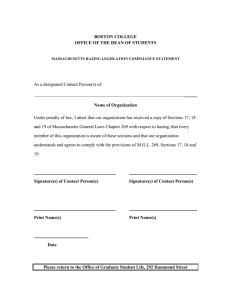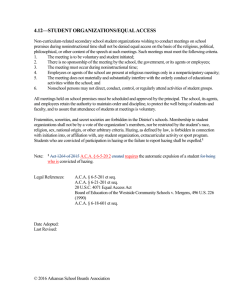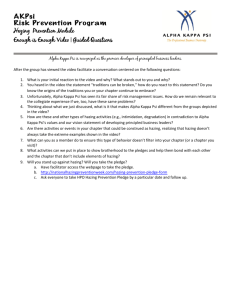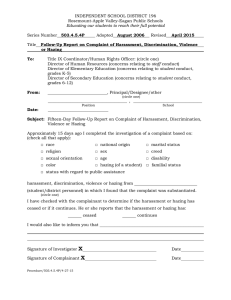Hazing Policy Kutztown University of Pennsylvania Student Code of Conduct
advertisement
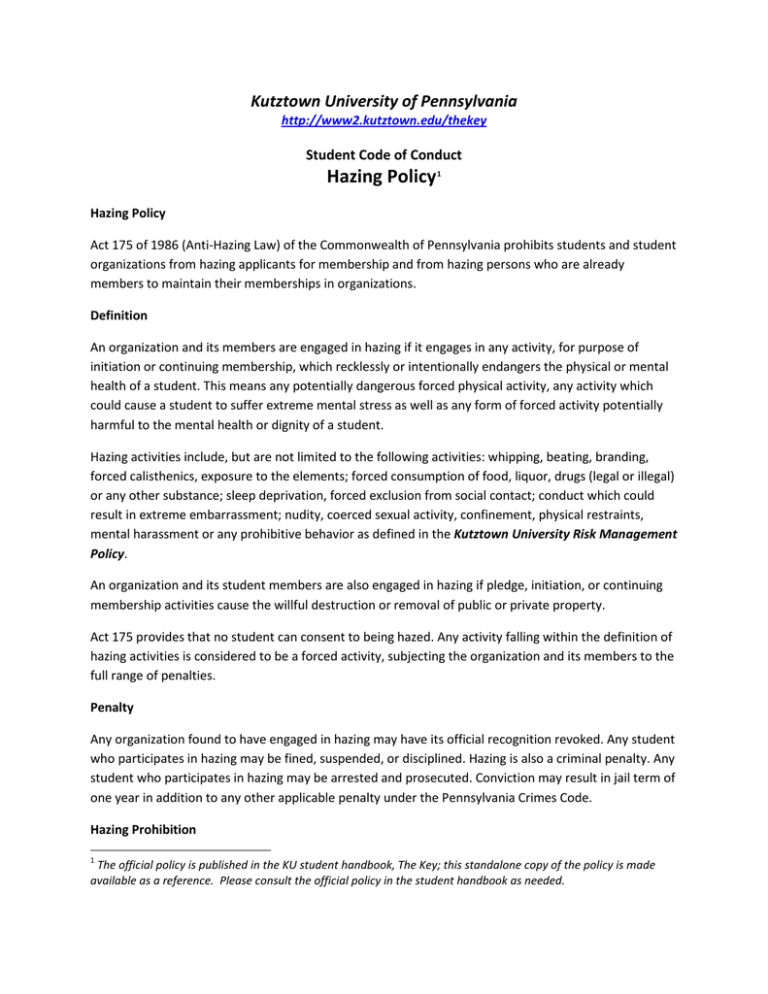
Kutztown University of Pennsylvania http://www2.kutztown.edu/thekey Student Code of Conduct Hazing Policy1 Hazing Policy Act 175 of 1986 (Anti-Hazing Law) of the Commonwealth of Pennsylvania prohibits students and student organizations from hazing applicants for membership and from hazing persons who are already members to maintain their memberships in organizations. Definition An organization and its members are engaged in hazing if it engages in any activity, for purpose of initiation or continuing membership, which recklessly or intentionally endangers the physical or mental health of a student. This means any potentially dangerous forced physical activity, any activity which could cause a student to suffer extreme mental stress as well as any form of forced activity potentially harmful to the mental health or dignity of a student. Hazing activities include, but are not limited to the following activities: whipping, beating, branding, forced calisthenics, exposure to the elements; forced consumption of food, liquor, drugs (legal or illegal) or any other substance; sleep deprivation, forced exclusion from social contact; conduct which could result in extreme embarrassment; nudity, coerced sexual activity, confinement, physical restraints, mental harassment or any prohibitive behavior as defined in the Kutztown University Risk Management Policy. An organization and its student members are also engaged in hazing if pledge, initiation, or continuing membership activities cause the willful destruction or removal of public or private property. Act 175 provides that no student can consent to being hazed. Any activity falling within the definition of hazing activities is considered to be a forced activity, subjecting the organization and its members to the full range of penalties. Penalty Any organization found to have engaged in hazing may have its official recognition revoked. Any student who participates in hazing may be fined, suspended, or disciplined. Hazing is also a criminal penalty. Any student who participates in hazing may be arrested and prosecuted. Conviction may result in jail term of one year in addition to any other applicable penalty under the Pennsylvania Crimes Code. Hazing Prohibition 1 The official policy is published in the KU student handbook, The Key; this standalone copy of the policy is made available as a reference. Please consult the official policy in the student handbook as needed. This policy prohibits the hazing of applicants for membership in student organizations; persons who are already members of organizations; or any other student for any other purpose. While the above policy is the official hazing policy of Kutztown University, any action taken or situation created, intentionally, whether on or off campus, to produce mental or physical discomfort, embarrassment, harassment, or ridicule is considered hazing. The listing below is an in-depth look at what activities are considered hazing. These activities include, but are not limited to: 1. Psychological hazing, which is defined as any act which is likely to: (a) compromise the dignity of another; (b) cause embarrassment or shame to another; (c) cause another to be the object of malicious amusement or ridicule; (d) or cause psychological harm or substantial emotional strain. 2. Holding new members to different standards than the membership of the organization, i.e. requiring new members to do study hours if that is not the requirement of all members. All standards of initiated members should apply to new members as well. 3. Humiliation in front of non-members by reference to “pledgeship.” 4. Line-ups of new members/recruits, or grilling individuals or groups with questions of any kind. 5. Deception prior to the end of an initiation process to convince a new member that he or she will not complete initiation/training. 6. (Non)Members told to do anything exclusively for the entertainment of the organization members. 7. Forcing, coercing, or permitting students to disrupt scheduled classes, public forums, or other facets of the University’s academic programs such as creating activities that are so time consuming that students cannot go to class, do homework, sleep, etc. 8. Any form of obtaining signatures of members or alumni (i.e. lists, on paddles, on balloons, etc...) or obtaining handshakes/greetings/phone calls. 9. All forms of physical activity not a part of an organized athletic contest and not specifically directed toward constructive work (push-ups, sit-ups, morning walks, calisthenics, etc.). No one truly knows the physical limitations of individuals and the safety of our students must always come first. 10. The application of foreign substances to the body, such as throwing food, spraying water of any temperature, etc. 11. Scavenger hunts of any kind. 12. Activities which result in illegal activity, new member ditches, kidnaps, unity walks, blindfolding, etc. 13. Forcing, coercing, or permitting students to be deprived of sufficient sleep. (Eight consecutive hours per day is the required standard.) 14. Any paddling, swatting, or individual or collective spanking. 15. Personal errands run by new members for returning organization members. 16. Assigning pranks such as stealing, painting objects, or harassing another team/organization. 17. Depriving students access to their residence hall rooms such as taking their keys, making them spend the night in another’s rooms or at a house, etc. 18. Not providing decent and edible food (i.e. no unusual combinations or preparation, colored foods, raw food, strange combination shakes, etc.). 19. Depriving student access to means of maintaining a normal schedule of bodily cleanliness (including a minimum of one shower per day). 20. Forcing, coercing or permitting students to eat or drink foreign or unusual sub-stances such as raw meat, salt water, onion, hot peppers, baby food, etc. 21. Forced nudity and/or forcing, allowing or suggesting that students dress in a conspicuous, embarrassing, and/or degrading manner. 22. Forcing, coercing, allowing, suggesting, or permitting students to drink excessive amounts of alcohol. 23. Branding/Tattooing any part of the body, whether voluntary or involuntary. 24. Forcing, coercing or permitting students to disrupt the operation of the University dining commons. 25. Any form of punishment/and or demerit system is prohibited. 26. Any activity or ritual that involves the abuse or mistreatment of an animal.
